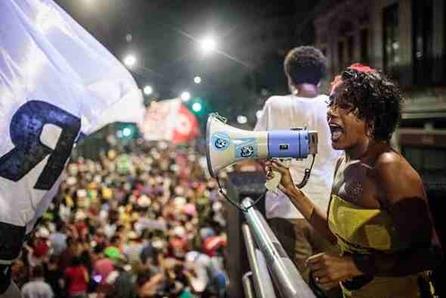
foto: Mídia Ninja
Meu artigo sobre o Golpe no Brasil para a revista inglesa “New Internationalist”
Corruption scandals, impeachment, power grabs, protest and a general strike this week. Mariana T Noviello explains the crisis engulfing her country – and what needs to happen
The consensus among the Brazilian Left is that the impeachment of President Dilma Rousseff was a coup d’etat. Though it was peacefully executed by the legislative, it received the backing of the same groups that supported the military coup in 1964: the judiciary, the media and the national entrepreneurial classes and financial sectors.
Direct moves to impeach President Rousseff were initiated at the end of 2014. But the process to remove the Workers’ Party (PT) from power began much earlier, in 2005, prior to the elections that led to Lula’s second term in office.
The so-called ‘Mensalão’ – a cash-for-votes scheme – saw some of the Party’s most important leaders tried and imprisoned under charges of ‘criminal responsibility’, whereby the Supreme Court did not need to show direct proof of involvement to condemn the alleged perpetrators.
Since 2005, the mainstream media has reported on the supposed corruption of PT members to the exclusion of anything and anyone else.
To everyone’s surprise, Rousseff was re-elected in 2014 by a small margin. However, 10 years of media demonization of the Workers’ Party meant that for the first time since Lula’s election, the PT and other left-wingers were unable to form a parliamentary majority.
The government thus became hostage to the votes of its centre-right leaning allies, in particular the Brazilian Democratic Movement Party (PMDB), Temer’s party.
A combination of economic recession, lack of support in parliament, and the Right and its media’s determination not to lose yet another election, set the scene for the impeachment.
Moreover the PT, once known for its strong grassroots links, became increasingly reliant on parliamentary support rather than its traditional base. Corruption allegations further increased the distance between voters, sympathizers and the Party.
Dilma alienated her supporters, who backed her re-election, by moving to the political Right in an attempt to regain the support of the country’s economic elite. Thus, the reaction on the Left to the impending impeachment was slow, lukewarm and rather late.
With unfolding events, it is now crystal clear the impeachment had no real basis and that two main reasons were behind the President’s removal:
One, to try and halt the corruption investigation known as Operation Car Wash which, rather than proving PT’s involvement, is now incriminating Temer’s government and allies.
Two, the Brazilian elite’s dissatisfaction with the ‘Big State’ and the potential return to power of Lula in 2018. This has fostered an attitude of ‘the end justifies the means’ amongst some of the country’s intelligentsia.
The judiciary’s support for the status quo is also evident, especially since the death in a plane crash of Teori Zavascki, the Supreme Judge in charge of the Car Wash investigations, and the appointment of Alexandre de Moraes, Temer’s former Minister of Justice.
What can the Left do?
The 2016 municipal elections revealed how much the support for the PT and the Left in general has declined. Numbers of elected left-wing councillors and mayors decreased to levels not seen since the 1990s, whilst other left-wing parties, such as the PSOL and the PCO, are backed mainly by metropolitan students and intellectuals without ties, as yet, to established social movements or the population in general.
Although mainstream media is owned by a handful of families, there is a myriad of alternative blogs and sites in Brazil. Some are linked directly to social movements and political parties, others are independent. There are also community blogs and several ‘fact checking’ sites doing interesting work.
However, they lack resources and tend to follow the mainstream media’s agenda. That is, they are reactive and generally unable to set the debate. They also tend to concentrate on opinion rather than investigative journalism and although the alternative media has been an important player in the resistance to the coup, it is usually accessed only by those already interested in seeking alternative views.
Given this scenario, it is unlikely that the advance of the Right will be halted through institutional means. Resistance the coup, therefore, needs to come from the streets and the social movements.
In spite of the coup, organized civil society has so far tended to focus on individual demands.
Since the impeachment, we have seen students occupying schools and universities to campaign for education rights and against cuts.
The cultural sector was quite effective in re-establishing the Ministry of Culture when the Temer government wanted to get rid of it.
Similarly, feminism and LGBT rights is gaining ground in Brazil, especially among the young. The women’s movement seems to gain small victories whenever it takes action: Temer was forced to appoint a few women after the fiasco of his all-white, all-male cabinet, was exposed.
On International Women’s Day these groups were out in force and Temer announced a fund to combat violence against women and extra resources for birth and reproductive health programmes.
Besides, the middle-classes and some in the traditional media are open to feminist and pro-LGBT views.
With the impending changes to social security and labour legislation, the unions are gearing up for action. Finally, they have called for a general strike, this Friday 28 April.
The amendments to social security and labour legislation are not expected to pass through Congress as easily as the changes that led to austerity cuts and the 20-year freeze on social spending. Parties allied to Temer are becoming uncomfortable with his unpopularity and some are showing signs of rebellion.
Finally, the land and housing movements recently staged a successful occupation of São Paulo’s Avenida Paulista, the financial heart of Brazil. Temer had cut funding for the lowest band of the ‘My House, My Life’ housing programme, negatively impacting poorer people.
Led by Guilherme Boulos, national coordinator of the MTST (Homeless Workers’ Movement) and one of the most promising leaders of the younger generation, the action resulted in the re-instatement of the programme after 22 days of occupation.
Calls for Temer’s departure have been heard since the impeachment, and ‘Temer Out’ cries became almost synonymous with this year’s Carnival. Furthermore, some intellectuals and academics are extremely uncomfortable with the impeachment and resulting developments.
The government itself is in disarray, having lost nine ministers in almost as many months, as it becomes known that Temer’s inner circle is wholly implicated in the Car Wash and other corruption scandals. Meanwhile the contrast between the discriminatory treatment of PT members, compared with politicians of other parties, is becoming increasingly evident.
But as Lula’s popularity grows so does the likelihood of his imprisonment. Even if Lula is allowed to run for the presidency, unless there is a concerted effort on the Left to unite and form some sort of ‘Frente Ampla’ (Broad Front), there will be no way out of this crisis.
Whilst most people’s hopes are on Lula’s re-election in 2018, he will be unable to achieve much unless other left-wing congress members are also elected and he receives the full support, not only of the population, but of the social movements and other sectors on the Left.
Social movements have shown that when they try they are able to bring about ad hoc changes to this government’s policies. But real change can only be achieved if all different factions and groups can come together under a common banner. If this does not happen, we can expect no progress.


